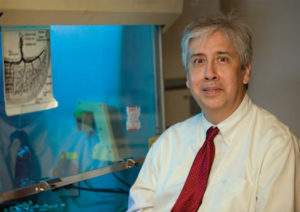Pro-life researcher speaks at Midwest March for Life
By Lindsay Steele
The Catholic Messenger
Dr. Alan Moy believes the culture of death in America permeates research and medicine. Embryonic stem cell research, fetal tissue studies and physician-assisted suicide are widely accepted. He fears human cloning could be next. Dr. Moy spoke about the issue of cloning at the Midwest March for Life luncheon Jan. 16.

Dr. Alan Moy poses for a photograph at his medical research laboratory in Coralville. A parishioner of St. Mary in Iowa City, Moy adheres to Catholic pro-life values in his cancer research.
The vice president of John Paul II Medical Research Institute (JP2MRI) in Coralville believes the Catholic community is often accused of trying to halt medical advancements and cures. He is adamant that pro-life scientists, physicians and the general public must inform themselves of the reality of the situation and speak out. “If we just use moral arguments, we’re going to lose. We have to get on the offensive” and show people a better way, he said in an interview with The Catholic Messenger.
JP2MRI has been working on a scientific process that could make human cell cloning a thing of the past. It could also eliminate a perceived need for embryonic stem cells in research and treatment of disease. The process, known as IPS Technology, takes a cell from an adult patient and genetically reprograms it so it functions like a stem cell. “There are many leading Catholic ethicists like Father Tad Pacholczyk at U.S. Catholic Bioethics Center who have acknowledged IPS cells as an ethical alternative to embryonic stem cells,” Dr. Moy said.
Currently, mainstream scientists and the medical community see “therapeutic cloning” as the best way to develop stem cells from patients. Eggs are extracted from a female and the nuclei are replaced by the patient’s nuclei, creating an embryo. The cells are developed for stem cell extraction, after which they will die. The Holy See believes this process is gravely offensive to human dignity, since it creates new life for the purpose of experimentation and eventual destruction. The Catholic Church opposes human cloning because it turns human reproduction into a manufacturing process, according to the U.S. Conference of Catholic Bishops. The USCCB also doubts the potential for human cloning to cure disease.
Potential health risks of the technology come from the donor receiving high doses of hormones and the frequency of tumors that develop from the cloned cells. IPS technology reduces these risks; the process is also cheaper, Dr. Moy said.
He said that now is the perfect time for people to speak out about cloning and alternatives, as little progress has been made in the field of traditional cloning. He called on the crowd at Midwest March for Life to learn more about IPS Technology and to become advocates.
“This should be a bipartisan issue! Generally, people would prefer, even if they are pro-choice, to have a treatment that could be equal to or better, more ethical and cheaper than” a less ethical treatment.
“We can reverse the trends in healthcare and deal with it in a positive way. In order to succeed, we need solidarity among Catholics. We need lawmakers who will support pro-life research initiatives, Catholics who will do better diligence when it comes to giving money to support medical research, pro-life scientists and physicians who are willing to speak out and educate, and Catholic hospitals that are willing to expand their mission.”











